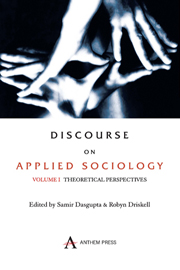Book contents
- Frontmatter
- Contents
- Preface and Acknowledgement
- Contributors to this Volume
- List of Abbreviations
- Introduction
- 1 Re-Orient World History, Social Theory and the Nineteenth Century
- 2 The Unique Complexity of Social Phenomena and the Uses of Social Science Knowledge
- 3 Unlimited Love, Compassion and Forgiveness: Acts of Moral Examplars
- 4 Theoretical Application
- 5 Applied Sociology's Need to Rethink the Tradition: Sociological Theorizing in a Global Framework
- 6 Social Analysis and Social Action
- 7 The Applied Sociologist as Craftsman
- 8 Applied Sociologists: Its Problems and Prospects
- 9 Sociology and its Application in Society: Giving Sociology its ‘Working’ Meaning
- 10 The Evolution of Sociology Back to its Applied Future
- 11 Contemporary Corporate Crime: Theoretical Perspectives, Cases & Consequences
- Index
10 - The Evolution of Sociology Back to its Applied Future
Published online by Cambridge University Press: 05 March 2012
- Frontmatter
- Contents
- Preface and Acknowledgement
- Contributors to this Volume
- List of Abbreviations
- Introduction
- 1 Re-Orient World History, Social Theory and the Nineteenth Century
- 2 The Unique Complexity of Social Phenomena and the Uses of Social Science Knowledge
- 3 Unlimited Love, Compassion and Forgiveness: Acts of Moral Examplars
- 4 Theoretical Application
- 5 Applied Sociology's Need to Rethink the Tradition: Sociological Theorizing in a Global Framework
- 6 Social Analysis and Social Action
- 7 The Applied Sociologist as Craftsman
- 8 Applied Sociologists: Its Problems and Prospects
- 9 Sociology and its Application in Society: Giving Sociology its ‘Working’ Meaning
- 10 The Evolution of Sociology Back to its Applied Future
- 11 Contemporary Corporate Crime: Theoretical Perspectives, Cases & Consequences
- Index
Summary
Applied sociology has been around for a long time. Lester Ward's distinction between ‘pure’ and ‘applied’ sociology in 1906 and the Outline of Applied Sociology, written by Yale's Henry Fairchild in 1916 are two of the most well-known indicators of the attention applied sociology received during sociology's emergent stage. After all, applied sociology as social reform – attracted many to the field of sociology – as illustrated by the Chicago School, making it an important part of sociology.
Lester Ward, the acknowledged founder of American sociology, wrote the classic Applied Sociology: A Treatise on the Conscious Improvement of Society by Society that provided an excellent illustration of the early integration of application and sociological knowledge. Furthermore, Ward, by training a botanist and zoologist, was attracted to the social world by his desire for its improvement. He states in his ‘Treatise’: ‘The purpose of applied sociology is to harmonize achievement with improvement’ (Ward, 1906). Like many of his contemporaries, Ward thought social knowledge should be used for social improvement and reform – ‘pure’ should result in ‘applied’, or ‘applied’ should be integral with ‘pure’.
An early example of this reform-oriented sociology is the ‘fivedollar day plan’ by Henry Ford and the development of the Ford Sociological Department within the company to conduct research to determine not only who should participate in the plan but also to suggest ways that non-qualifiers could alter their behaviour to qualify (Loizedes & Sonnad, 2004).
- Type
- Chapter
- Information
- Discourse on Applied SociologyTheoretical Perspectives, pp. 237 - 248Publisher: Anthem PressPrint publication year: 2007
- 1
- Cited by



